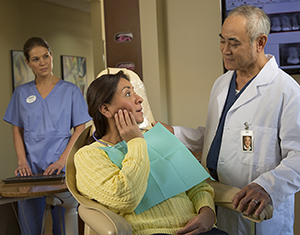A
B
C
D
E
F
G
H
I
J
K
L
M
N
O
P
Q
R
S
T
U
V
W
X
Y
Z
Click a letter to see a list of conditions beginning with that letter.
Click 'Topic Index' to return to the index for the current topic.
Click 'Library Index' to return to the listing of all topics.
Treating Sensitive Teeth
See your dentist if you have sensitive, painful teeth. Your dentist will examine your teeth to find the cause of your tooth sensitivity. Then they'll advise a treatment plan.
Your dental exam
Your dentist will check your teeth for sensitivity to cold, air, or heat. Let them know if you have foods or drinks that are high in acid. These include citrus fruits and sports drinks. Also tell your dentist about any stomach problems you may have that bring acid into your mouth. Your dentist will also look inside your mouth to check for decayed teeth, or teeth worn by incorrect brushing. If needed, X-rays will be taken. You may also be checked for signs of teeth grinding, or clenching. You may start out with a special oral hygiene program for home care. In addition to home care, your dentist may also suggest professional treatment.

Home care
Your dentist may suggest that you follow an oral hygiene program at home. Use a toothbrush with soft bristles. If any roots are exposed, you may be asked to use a special toothpaste. This toothpaste makes teeth less sensitive. Your dentist may also suggest that you try a fluoride rinse or gel, or a desensitizing toothpaste. Cleaning all parts of your teeth and mouth helps prevent tooth sensitivity and decay.
Professional treatment
Depending on how sensitive your teeth are, your dentist may advise professional treatment. They may:
-
Apply special chemicals to the sensitive areas.
-
Use a coating of resin to seal the dentin.
-
Fill cavities or deep grooves in any exposed root.
-
Apply a fluoride varnish to the root surface.
Know that your teeth can become sensitive again. Make sure to follow your home-care treatment plan. Also schedule regular dental exams. By working with your dentist, you can help keep your teeth pain-free.
Online Medical Reviewer:
Jessica Gotwals RN BSN MPH
Online Medical Reviewer:
Michael Kapner MD
Online Medical Reviewer:
Rita Sather RN
Date Last Reviewed:
7/1/2022
© 2000-2024 The StayWell Company, LLC. All rights reserved. This information is not intended as a substitute for professional medical care. Always follow your healthcare professional's instructions.